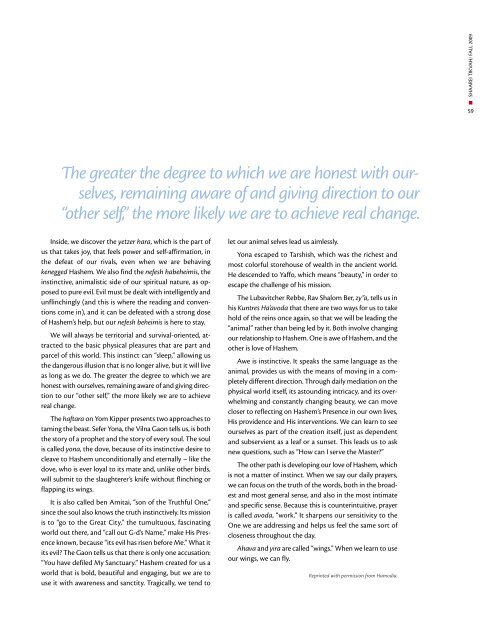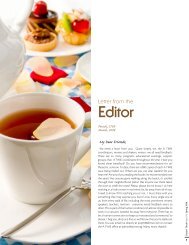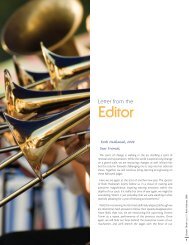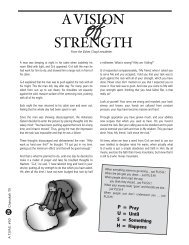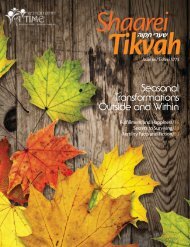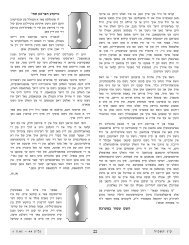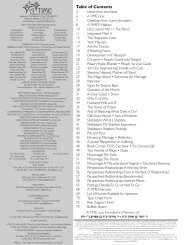Rosh Hashana 5770/2009 - Jewish Infertility
Rosh Hashana 5770/2009 - Jewish Infertility
Rosh Hashana 5770/2009 - Jewish Infertility
Create successful ePaper yourself
Turn your PDF publications into a flip-book with our unique Google optimized e-Paper software.
SHAAREI TIKVAH/ FALL <strong>2009</strong><br />
59<br />
The greater the degree to which we are honest with ourselves,<br />
remaining aware of and giving direction to our<br />
“other self,” the more likely we are to achieve real change.<br />
Inside, we discover the yetzer hara, which is the part of<br />
us that takes joy, that feels power and self-affirmation, in<br />
the defeat of our rivals, even when we are behaving<br />
kenegged Hashem. We also find the nefesh habeheimis, the<br />
instinctive, animalistic side of our spiritual nature, as opposed<br />
to pure evil. Evil must be dealt with intelligently and<br />
unflinchingly (and this is where the reading and conventions<br />
come in), and it can be defeated with a strong dose<br />
of Hashem’s help, but our nefesh beheimis is here to stay.<br />
We will always be territorial and survival-oriented, attracted<br />
to the basic physical pleasures that are part and<br />
parcel of this world. This instinct can “sleep,” allowing us<br />
the dangerous illusion that is no longer alive, but it will live<br />
as long as we do. The greater the degree to which we are<br />
honest with ourselves, remaining aware of and giving direction<br />
to our “other self,” the more likely we are to achieve<br />
real change.<br />
The haftara on Yom Kipper presents two approaches to<br />
taming the beast. Sefer Yona, the Vilna Gaon tells us, is both<br />
the story of a prophet and the story of every soul. The soul<br />
is called yona, the dove, because of its instinctive desire to<br />
cleave to Hashem unconditionally and eternally – like the<br />
dove, who is ever loyal to its mate and, unlike other birds,<br />
will submit to the slaughterer’s knife without flinching or<br />
flapping its wings.<br />
It is also called ben Amitai, “son of the Truthful One,”<br />
since the soul also knows the truth instinctively. Its mission<br />
is to “go to the Great City,” the tumultuous, fascinating<br />
world out there, and “call out G-d’s Name,” make His Presence<br />
known, because “its evil has risen before Me.” What it<br />
its evil The Gaon tells us that there is only one accusation:<br />
“You have defiled My Sanctuary.” Hashem created for us a<br />
world that is bold, beautiful and engaging, but we are to<br />
use it with awareness and sanctity. Tragically, we tend to<br />
let our animal selves lead us aimlessly.<br />
Yona escaped to Tarshish, which was the richest and<br />
most colorful storehouse of wealth in the ancient world.<br />
He descended to Yaffo, which means “beauty,” in order to<br />
escape the challenge of his mission.<br />
The Lubavitcher Rebbe, Rav Shalom Ber, zy”a, tells us in<br />
his Kuntres Ha’avoda that there are two ways for us to take<br />
hold of the reins once again, so that we will be leading the<br />
“animal” rather than being led by it. Both involve changing<br />
our relationship to Hashem. One is awe of Hashem, and the<br />
other is love of Hashem.<br />
Awe is instinctive. It speaks the same language as the<br />
animal, provides us with the means of moving in a completely<br />
different direction. Through daily mediation on the<br />
physical world itself, its astounding intricacy, and its overwhelming<br />
and constantly changing beauty, we can move<br />
closer to reflecting on Hashem’s Presence in our own lives,<br />
His providence and His interventions. We can learn to see<br />
ourselves as part of the creation itself, just as dependent<br />
and subservient as a leaf or a sunset. This leads us to ask<br />
new questions, such as “How can I serve the Master”<br />
The other path is developing our love of Hashem, which<br />
is not a matter of instinct. When we say our daily prayers,<br />
we can focus on the truth of the words, both in the broadest<br />
and most general sense, and also in the most intimate<br />
and specific sense. Because this is counterintuitive, prayer<br />
is called avoda, “work.” It sharpens our sensitivity to the<br />
One we are addressing and helps us feel the same sort of<br />
closeness throughout the day.<br />
Ahava and yira are called “wings.” When we learn to use<br />
our wings, we can fly.<br />
Reprinted with permission from Hamodia.


